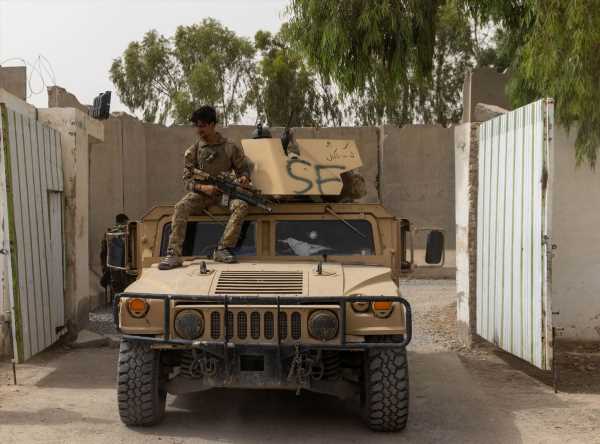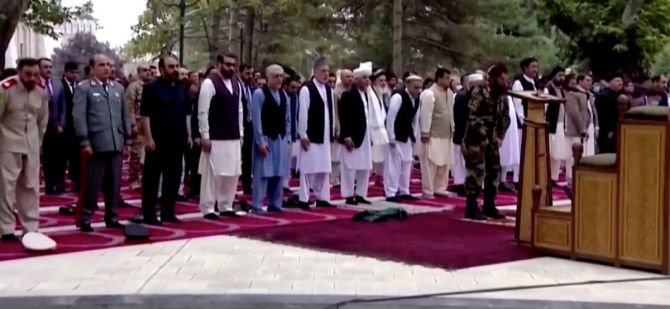‘India has to ensure its borders are properly sealed and there is no infiltration from PoK.’
“50% of the Afghan population is below 15. They have seen the Americans all their life. It is a very different Afghanistan. These youngsters have seen education, women empowerment, Internet, mobiles.”
“There will be a lot of opposition to the Taliban’s old way of governance within Afghanistan,” predicts Lieutenant General Sanjay Kulkarni (retd), PVSM, AVSM, SC, SM, VSM.
The General was former chief of staff of the XIV Corps responsible for the border with China, Pakistan and the Siachen Glacier and director general, Infantry.
“The geopolitics of our region is alarming. We have to be alert and ensure our borders are properly sealed,” General Kulkarni tells Rediff.com‘s Archana Masih.
- Part 1: ‘Ladakh standoff is not Kargil’
With the situation unravelling in Afghanistan and our troops deployed on both the China and Pakistan fronts — how will it affect the security situation in India?
The lines are blurred on the LAC (Line of Actual Control, which separates India from China). As far as Afghanistan is concerned — if the country is peaceful, the LoC (Line of Control, which separates India from Pakistan) will be peaceful.
Across the LoC, China is already present in PoK (Pakistan occupied Kashmir). They are constructing the China Pakistan Economic Corridor which runs through PoK up to Gwadar.
The Chinese have lost engineers in the bus bomb blast which will severely impact the conduct of the Chinese in building the power project in Khyber Pakhtunukhwa. It will delay it by months.
The Pakistan government has appropriated a division (of the Pakistan army) — not less than 20,000 men — to provide protection to the Chinese involved in the project.
Pakistan has assured them security while the Chinese have put in investment. It is Xi Jinping’s vision to open the Gwadar port.
A trillion dollar worth of goods will be transported along the CPEC. The Pakistan citizen is not going to get anything from it because the Chinese are going to transport goods for their own country.
The Chinese would first want to recover the 60 billion dollars that they have invested in the project.
How worried do you think China is with the Taliban taking control of border crossings which has brought them close to Xinjiang?
Afghanistan shard a border with Pakistan, Iran, Tajikistan, Turkmenistan, Uzbekistan and China. It has the longest border with Pakistan — almost 1,500 miles — 900 miles with Iran, 800 odd miles with Tajikistan, 89 miles with Uzbekistan, another 400 miles with Turkmenistan.
Through the Wakhan corridor, the Afghans are 47 miles from Xinjiang province.
The Taliban told the Chinese that they would not interfere in China’s internal affairs and China should not interfere in their Islamic affairs.
If the Taliban feel very strongly that the Islamic identity of Xinjiang is being threatened, what prevents the hardcore Taliban from going into Xinjiang? This is a cause of worry for the Chinese. It is a catch-22 situation.
China is building a 80 km road through the Wakhan corridor which connects Afghanistan to China.
The 80 km road is part of China’s Belt and Road Initiative. It covers 2/3rd of the Wakhan corridor which is around 320 km long — at the narrowest part, the road is about 18 km wide and 65 km at the widest part.
They are making this road in the Wakahan corridor to assist the Afghans and to ensure that there is no interference from Afghanistan or Pakistan in Xinjiang.
The Chinese have also built a huge base in Tajikistan just 12 miles from the Wakhan corridor.
The Chinese are concerned with the developments taking place in Afghanistan. They had hoped Pakistan — their surrogate State — would help them in Afghanistan.
The Chinese are saying that the American withdrawal has been hasty because the Taliban has taken control of all international borders which has the Chinese worried.
The Taliban is a ruthless force that is overrunning the country and aims at overthrowing the Afghan government. What imponderables does this pose for the region?
The Taliban comprises Pathans. Pathans have a ‘Pashtunwali’ code, which means that pride and baradari come first.
They are Sunni Muslims, but consider themselves Pathans first.
That is why the Taliban insist on the Emirate of Afghanistan, not the Islamic Republic of Afghanistan.
By ‘Emirate’ they mean the rule of the Pathans according to Sharia law.
The Pathans have been ruling Afghanistan for the last 250 years.
The Taliban also demands a Pashtunistan in Pakistan.
There is a lot of conflict of interest happening in Afghanistan which has rightly been called the Graveyard of Empires.
What challenges does it this pose for India’s security forces?
It is a big challenge. India has taken the right step by trying to negotiate with the Taliban which has been classified by the UN as a terrorist organisation like Hamas.
Hopefully, the Taliban will transform into a political organisation.
They were in power before the American came into Afghanistan after September 11.
The Taliban are Pathan dominated. Pathans comprise 42% of Afghanistan.
There are 63 million Pathans around the world — 13-15 million are in Afghanistan — the rest are in other countries including India which has 3.2 million Pathans.
We have had very good relations with Pathans going back to Khan Abdul Ghafar Khan known as Frontier Gandhi. Over a period of time we have developed very good relations with the Tajiks, Uzbeks and Hazaras as well.
India has invested in building the parliament building, hospitals, roads, etc in Afghanistan, while Pakistan has exported terror.
The Afghan national army is almost 3 lakh in numbers and equipped by America and NATO, but is unable to stand up to the Taliban.
The Afghan ambassador in India has said they may need military assistance from India.
I don’t think so. We should help so that there is a government of the Afghanis, by the Afghanis and for the Afghanis.
Our help should extend to agriculture, medical, infrastructure development and digital governance.
We should continue talking to the Taliban and the Afghan national government, but I don’t think we can expect much from the Taliban.
They will take Afghanistan back to the 18th century.
50% of the Afghan population is below 15. They have seen the Americans all their life so it is a very different Afghanistan. These youngsters have seen education, women empowerment, Internet, mobiles.
People say a civil war is not likely because the Taliban is ruthless, but there will be a lot of opposition to the Taliban’s old way of governance within Afghanistan.
The geopolitics of our region is alarming. We have to be alert and ensure our borders are properly sealed.
We should ensure there is no infiltration from PoK. The Taliban resurgence will boost the morale of sleeper cells within India.
Feature Presentation: Aslam Hunani/Rediff.com
Source: Read Full Article


